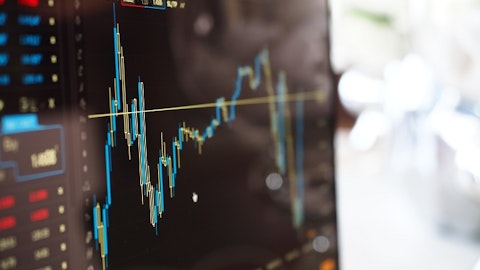1. JD.com, Inc. (NASDAQ:JD)
IvyRock Asset Management’s Stake Value: $24,460,000
Percentage of IvyRock Asset Management’s 13F Portfolio: 23.17%
Number of Hedge Fund Holders: 76
A Chinese ecommerce company based out of Beijing, JD.com, Inc. (NASDAQ:JD) is the largest holding of Charles Huang’s IvyRock Asset Management, with the investment firm owning 338,600 shares in JD.com, Inc. (NASDAQ:JD), worth $24.46 million, representing 23.17% of the firm’s portfolio as of June this year. JD.com, Inc. (NASDAQ:JD) is a major online retailer in terms of sales volume and revenue. The company has a robust business model consisting of direct sales, where the entire supply chain is controlled by JD.com, Inc. (NASDAQ:JD), with a marketplace that accepts a limited number of sellers for strict quality assurance purposes.
To improve its logistics capacity, JD.com, Inc. (NASDAQ:JD) is actively investing in drones, artificial intelligence, robotics, driverless trucks, and autonomous technology, to offer seamless delivery to its customers.
Barclays analyst Jiong Shao, on November 2, kept an Overweight rating on the shares with a $98 price target. According to Shao, JD.com, Inc. (NASDAQ:JD) is a dominant ecommerce platform that has set itself apart from its competitors, and with the growing Chinese technology sector, it is one of the most solid Chinese stocks.
At the end of June, 76 hedge funds tracked by the database of Insider Monkey’s elite funds were bullish on JD.com, Inc. (NASDAQ:JD), up from 75 in Q1.
Here is what Arisaig Partners has to say about JD.com, Inc. (NASDAQ:JD) in its Q2 2021 investor letter:
“JD.com, for example, continues to display impressive operating momentum, with sales on track to grow around 30% this year by our estimates. Looking longer term, this company is making a credible claim to be the dominant player in Chinese grocery ecommerce, an enormous chunk of overall consumption in China, and the last one yet to move online in a big way. We think that JD has a clear advantage over rivals here thanks to its integrated and fully self-managed logistics capabilities. Whereas an offline big box retailer might have 10-20,000 SKUs, JD offers 8 million. 90% of orders fulfilled by JD Logistics can be delivered on the same day or the next day to 500 million customers. The fact that JD has just 30 days of inventory tells us that this is a highly-optimised fulfilment chain. It is very hard to be both fast and efficient, and in order to achieve this it is necessary to know what inventory to hold in which warehouse, and when to hold it (“right place, right time, right person”), a highly information-intensive challenge. The only other retailer that comes close to being able to manage that level of complexity is Amazon, and indeed these are capabilities that are very hard to replicate, taking decades of painstaking investment, trial and error testing, and data accumulation.
Moreover, far from being some sort of ‘victim’, this company is most likely a beneficiary of tighter regulation in this sector. A recurrent message running through JD’s recent investor day was that of “deep purpose”, the objective being to create shared value for a broader ecosystem of customers, merchants and employees. As we describe in the next section on “Navigating China”, this form of alignment with the strategic objectives of the government is a very China-specific way of conceptualising ESG, and essential for all businesses that operate in this country to get right.
It has taken us many years to build up confidence on this name, and this was not a straightforward process for us. We began our due diligence on JD back in 2016 before investing in 2018. Speaking candidly, the next two years were very challenging from a behavioural investing standpoint. The stock price gyrated as the market fixated on quarterly results prints which, at face value, were mixed. Whilst the company was growing revenues and was operating cash flow positive over this period, it was also generally loss-making at a net level, having made the decision to re-invest aggressively in order to build scale and develop the world-leading logistics capabilities we mentioned above.
The fruits of these initiatives are only now becoming apparent. Despite continuing aggressive reinvestment, the power of scale leverage has been such that the company is now comfortably profitable, with operating profit of USD1.8bn over the last twelve months (a margin of 1.5%). Although hindsight is a wonderful thing, and we obviously could not be certain that today’s reality would be the eventual outcome for JD when we were assessing this a couple of years ago, we nonetheless felt that this was the most probable long-term destiny for the company. Meanwhile, the market was focussed on quarterly earnings versus ‘street’ expectations as opposed to thinking about the far greater long term intrinsic value that would result from JD’s dogged commitment to reinvest. For this reason, we topped up our position in the company back in late 2018. As fundamentals strengthened over the course of 2019 and 2020, so followed the share price.
Fast forward to the present day, and we see once again a share price decline which appears divorced from the fundamentals. JD’s shares are down 19% year-to-date from not particularly lofty valuations. Today our in-house DCF tool, the Arisaig “Crystal Ball”, projects around 14% long-term (20-year) returns. On a shorter-term view, the stock is trading at 15x FY23 EV/EBITDA. Both the Asia and the Global Funds have taken this opportunity to further increase our positions.
Again, returning to what is ‘knowable’ – there are close to a billion internet users in China. On average they spend c.4 hours per day online; 25% of retail spending is already online (it seems entirely plausible that the majority will be in the not-too-distant future); and China is re-inventing itself as a domestically-focussed consumer economy with innovation and digitisation acting as catalysts (this is not speculation, it is explicit government policy). This points to a very strong likelihood that the theme of digital consumption will be one of the defining features of China’s economic development over the coming decades. The logical follow-on is that owning the best-quality, highest-growth operators in this space (in our view: JD.com, Meituan and Alibaba) absolutely must be a keystone element in our investment strategy. This is about as close as we can come in the field of investment to what is truly ‘knowable’. This seems far more relevant than any discussions on short-term factor rotations or trying to catch some fleeting bounce in beaten down old economy stocks!
All of the above is to say that for long-term investors such as us, periods such as the past six months – lagging share-prices combined with ever-strengthening fundamentals – are times of opportunity. This focus on strategy not tactics, and a capacity to suffer through share price volatility, is the essence of a behavioural discipline which we term ‘Endurance Investing’. Whilst the notions of behavioural edge and time-horizon arbitrage are quite widely known, we believe that surprisingly few investors can follow through on this approach, mainly because incentive structures and performance measurement in our industry are so skewed towards the short-term. As we learned with JD in 2018, and as we are being reminded today, holding one’s nerve, shutting out the noise, and continuing to behave rationally during rough markets is not easy, but is precisely what we are paid to do. We are privileged to have a base of end investors who understand all of this, and have been rock solid over the course of this year. Indeed, we have enjoyed positive inflows across all three of our strategies. This alignment with our clients is ultimately what gives us the psychological comfort that makes endurance investing possible.”
You can also take a look at David Greenspan’s Slate Path Capital is Buying Coinbase, Stitch Fix, and More and Deccan Value Investors’ Top Stock Picks: Facebook, Herbalife and More.





